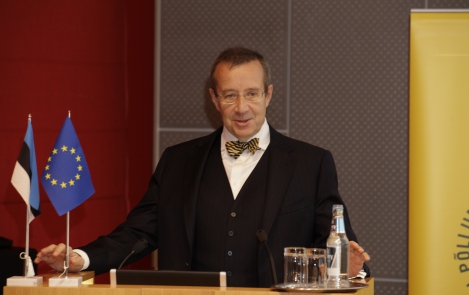-
Reset
+


The President, Toomas Hendrik Ilves, at the ceremony for Farmer of the Year Tallinn, 6 November 2012
06.11.2012
Respected farmers,
Far too often we ask who is feeding or supporting who when we speak about agriculture. And this tends to outshine the fact that for at least the last 150 years, agriculture has been a catalyst for major social changes that have taken place.
This may sound like a paradox as farmers are often depicted, both in real life and literature, as conservative and staid types, who are the last to adapt to change. However, historically, as we observe agriculture as a sphere of activity against the backdrop of economic development, we see that agriculture has been the first to prevail through all sorts of revolutions that have come as a result of achievements in research and technology.
Let us start from the most important component of any economy – a human being. At the beginning of the last century, after the first wave of urbanisation, the majority of Estonia's population was involved in agriculture, perhaps as many 800,000 people in all, including children. The number employed in agriculture has fallen over the past four generations by approximately 40 times and by seven to eight times during our most recent period of freedom.
Each and every new form of consumer technology, be it combustion engine, electricity or computer, leads to the shedding of jobs in the agricultural sector, while increasing production levels. In agriculture, more than in any other sphere of the economy, the achievements of genetics and biotechnology are being used most extensively.
I want to emphasise here that the very same inevitable processes have taken place, at later stages, in the industry and service sectors. Some spheres are about to face serious jobs losses. And it is vital that these sectors learn from agriculture about how to cope with these material changes.
Agriculture has been a pioneer and I do not see any good reason why it should not continue like this. By this, I mean information technology, which facilitates the development of the so-called smart market that brings together sellers and buyers in a manner involving as little expense as possible. Therefore, the usage of information technology for more accurate and smarter marketing of one's produce – in turn omitting the long, expensive and complicated chain of mediators – could become the essence of the next major change in agriculture.
For example, we already have a number of Internet companies that allow us to order fresh farm produce direct from Estonian farmers. Indeed, the markets are where the consumers are, not where the soil is, especially when we speak about food products. Therefore, physical markets are located in towns.
Respected audience,
I do know that you have spoken at length today about the Common Agricultural Policy of the European Union and the direct support schemes. Until now, these mechanisms have distorted the common market for our farmers and are a blemish on the face of the expression "free competition". I do hope that the Estonian Government together with our deputies in the European Parliament will be consistent enough for competition in agriculture to become free for Estonia and countries like Estonia and for the market to become genuinely uniform. Brussels does not believe in tears, however; we must believe in laws. And if we encounter some obstacles here, Estonia must go to court to protect the principles of the internal market of the European Union, free competition and its farmers.
But now I wish the candidates of this year's Farmer of the Year award and everyone standing behind their wide back courage and willingness to be successful and remain open to changes. If you take the first step, the others will follow. As they always do.
* This year's winner of the annual agricultural personality of the year competition organised by the weekly newspaper Maaleht is Raivo Külasepp, Executive Director of the Grüne Fee Eesti AS company based in the Luunja rural municipality of the Tartu County.




